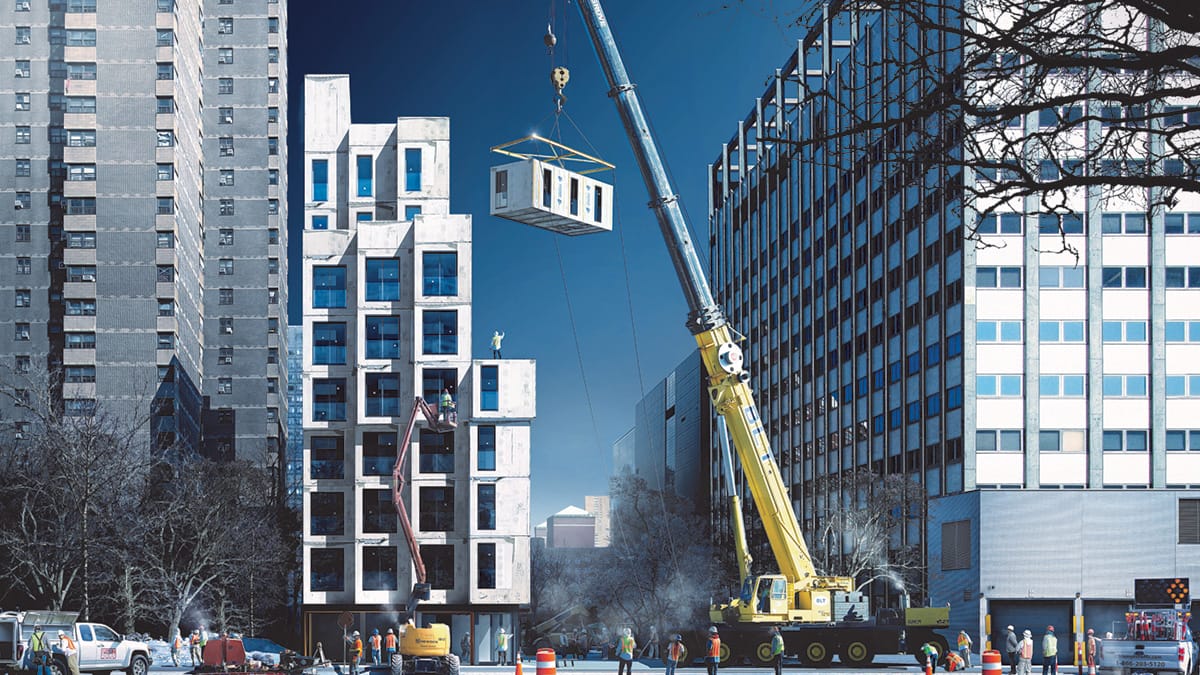Training for MBI Members and Beyond

Heather Packard is the professional and workforce development director for the Modular Building Institute.
By the Numbers, which appeared in the January/February 2024 issue of Modular Advantage, highlighted member needs articulated as part of an intelligence gathering process I initiated in the fall of 2023. This feedback included requests for MBI to create and offer professional development opportunities for member companies and staff, particularly to support new staff on-boarding and training efforts.
Members also expressed a desire for MBI to engage in outreach to academic universities, with a goal towards increasing the supply of better-trained and more well-rounded future designers, architects, engineers, estimators, project managers, and more for our industry.
In response to member feedback, I’m pleased to announce that, in early December, we launched the MBI Learning Center – a destination where stakeholders can experience personal and professional growth and acquire expertise necessary to succeed in our industry – and our first self-paced, online course, Introduction to Commercial Modular Construction.

This first online course introduces learners to an innovative, exciting, and sustainable modern method of construction. It’s designed to help learners gain a comprehensive introduction to the commercial modular construction industry and understand the basics of modular design, manufacturing, and construction. The course offers in-depth explanations of the process, key roles and responsibilities of stakeholders, and the concepts and terminology used in modular building.
Developed with adult learners in mind, the course offers a focused, flexible learning opportunity to upskill efficiently. It is comprised of six modules, broken down into multiple lessons with interactive elements and knowledge checks, and a final learning assessment in multiple choice format.
Successfully completing the Introduction to Commercial Modular Construction online course awards a learner with a certificate of completion and can help demonstrate that they have gained a foundational understanding of the modular construction process, including roles and responsibilities and commonly used terminology. For those already working within or new to the industry, it can help increase understanding on how and where their role fits within the process and provided a shared vocabulary. For students aspiring to work in the industry, it can offer the same while also increasing potential employability.
MBI’s Introduction to Commercial Modular Construction course is open to anyone interested in the modular construction industry. From industry aspirants and newcomers to experienced professionals, this course is an excellent way to become fully versed in the fundamentals of commercial modular construction.
Please visit the MBI Learning Center to view more details about the new course and other available learning assets, including articles, research, and podcasts.
Do You Work for an MBI Member Company?
MBI member companies and staff are eligible to access Introduction to Commercial Modular Construction as a benefit of MBI corporate membership. If you have not yet received your coupon code to discount the pricing, please contact us.
Are You a University Professor or Student Interested in Modular Construction Curriculum?
Please contact Heather Packard (heather@modular.org) to learn more about university access and available resources.
More from Modular Advantage
AoRa Development Aims for New York’s First Triple Net Zero Building Using Modular Methods
More cities are providing funding for newer infrastructure projects as long as they meet sustainability requirements. This is how modular can fit the bill, thanks to its lower waste production.
Developers and Designers: Lessons Learned with Modular Design
Modular construction is attractive to many developers because sitework and module construction can occur simultaneously, shortening the schedule and reducing additional costs.
UTILE: Putting Modular Building on a Fast Track
In Quebec, UTILE is taking the lead in creating affordable modular buildings to help decrease the student housing shortage. During the process, the company discovered what it takes to make the transition to modular building a success.
Sobha Modular Teaches Developers How to Think Like Manufacturers
With its 2.7 million square foot factory in UAE, Sobha Modular is bringing both its high-end bathroom pods to high-end residences to Dubai while developing modular projects for the U.S. and Australia.
RoadMasters: Why Early Transport Planning is Make-or-Break in Modular Construction
In modular construction, transportation is often called the “missing link.” While it rarely stops a project outright, poor planning can trigger costly delays, rerouting, and budget overruns.
Navigating Risk in Commercial Real Estate and Modular Construction: Insights from a 44-Year Industry Veteran
Modular projects involve manufacturing, transportation, and on-site assembly. Developers must understand exactly what they are responsible for versus what they subcontract. Risk advisors should research the developer’s contractors, subcontractors, and design-build consultants—especially the modular manufacturer.
Art²Park – A Creative Application of Modular and Conventional Construction
Art²Park is more than a park building—it’s a demonstration of what modular construction can achieve when thoughtfully integrated with traditional materials. The use of shipping containers provided not only speed and sustainability benefits but also a powerful structural core that simplified and strengthened the rest of the building.
Building Smarter: A New Standard in Modular Construction Efficiency
Rising material prices, labour shortages, expensive financing and tightening environmental rules have made conventional construction slower, costlier, and more unpredictable. To keep projects on schedule and within budget, builders are increasingly turning to smarter industrialized methods.
Resia: Breaking All the Rules
Resia Manufacturing, a division of U.S.-based Resia, is now offering prefabricated bathroom and kitchen components to industry partners. Its hybrid fabrication facility produces more precise bathroom and kitchen components (modules) faster and at lower cost than traditional construction. Here’s how Resia Manufacturing does it.
How LINQ Modular Innovates to Bring Modular To The Market in the UAE and Beyond
LINQ Modular, with an office and three manufacturing facilities in Dubai, is a modular firm based in United Arab Emirates. The company is on a mission: to break open the housing and construction markets in the Gulf Cooperation Council (GCC) area with modular.










